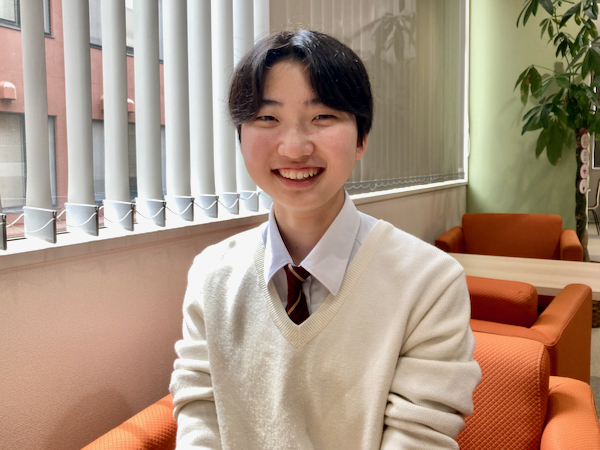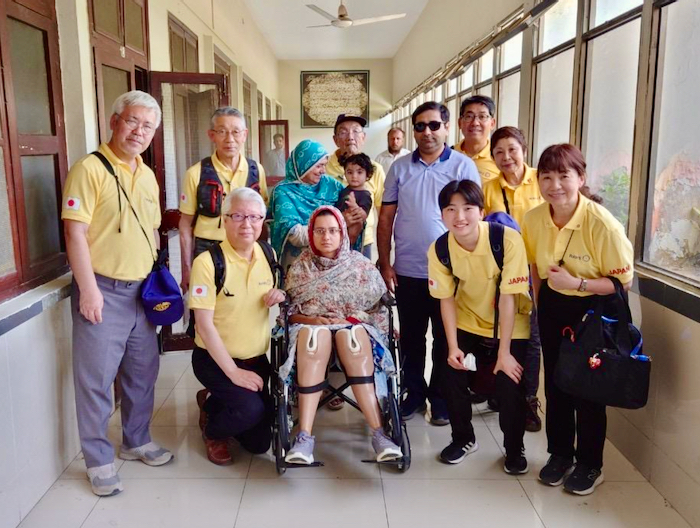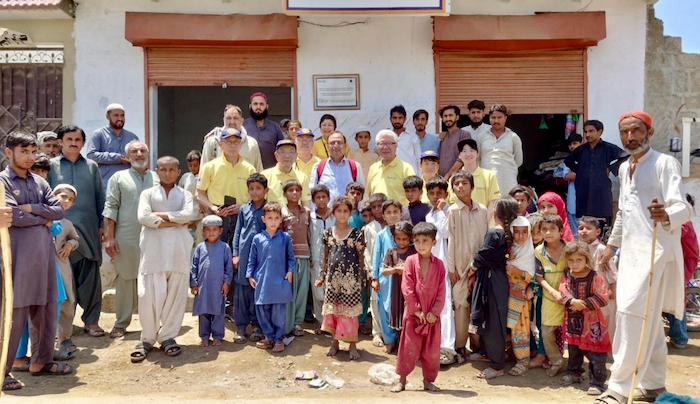Senior
A Journey to Eradicate Polio: An Interview with Sayna Yanagisawa on Her Mission in Pakistan
ib
From April 20th to April 24th, 2024, Sayna Yanagisawa participated in a crucial polio eradication mission in Pakistan. We sat down with Sayna to discuss her experiences, the challenges she faced, and the inspiring moments that marked her journey.

Arrival and First Impressions
Q: Sayna, can you share your initial thoughts upon arriving in Karachi?
A: "When my mother and I arrived in Karachi, after meeting with our team in Bangkok, the city didn’t exactly feel safe. There were many armed police officers on the streets and going through multiple security checks just to enter our hotel was quite intimidating. It set a somber tone for what was to come."
Activities and Experiences on the Ground
Q: What were the main activities during the first few days?
A: "On our second day, we headed to Thatta where we attended the opening ceremony of a solar energy water purification plant funded by Japanese Rotary club donations. It was heartening to see the local Pakistani participants’ joy as they could now access clean water easily. However, the same day brought us face-to-face with the challenges of our mission during our visit to Karachi Cantonment Station where we vaccinated children. Despite our efforts, many parents were either unaware of the dangers of polio or were hesitant to cooperate due to their misunderstandings about the effect of the vaccines."
Q: Can you tell us about the different locations and people you encountered?
A: "Certainly. On April 22nd, we visited a medical clinic in Hyderabad, which is a lifeline in a district with few medical facilities. Later that day, we were in Latifabad, a slum area where generations of Hindu families have lived in difficult conditions. Despite the squalor and the stench, when we conducted vaccinations there, the community was very receptive, unlike at the Cantonment Station."
Challenges and Cultural Encounters
Q: Were there any particular challenges that stood out during the mission?
A: "Traffic safety seemed to be a major issue, especially in rural areas. The lack of safety awareness was alarming. More deeply, the visit to Jinnah Hospital to meet Huma Ashraf, a vaccination worker who lost her legs in an accident, was moving. It highlighted the risks health workers take daily. The stark socio-economic disparities became evident when we moved from impoverished campsites to upscale residential areas within minutes."

Q: What were some of your reflections from interacting with the Pakistani community?
A: "The warmth and hospitality of the people, despite the hardships they face, were truly humbling. Children at a campsite eagerly participated in the vaccination process, which was a touching experience. It demonstrated the universal desire for health and well-being across communities."

Overall Reflections and Future Goals
Q: How has this mission influenced your views or future plans?
A: "This mission has profoundly deepened my understanding of the cultural and social dynamics in Pakistan. It’s a reminder of our shared humanity, regardless of language or background. Seeing children begging on the streets was a stark reminder of the world’s inequalities and has reinforced my commitment to advocating for every child’s right to a healthy life. I'm motivated more than ever to continue working towards making a significant difference."
Closing Thoughts
As Sayna concluded her recount of the mission, it was clear that the experience was not just about administering vaccines but also about engaging with and understanding a diverse culture. Her journey underscores the complexities of public health initiatives in developing countries and the resilience required to push forward in challenging environments. Sayna’s dedication to her mission offers inspiration to us all, reminding us of the impact one individual can have on the world stage.
Arrival and First Impressions
Q: Sayna, can you share your initial thoughts upon arriving in Karachi?
A: "When my mother and I arrived in Karachi, after meeting with our team in Bangkok, the city didn’t exactly feel safe. There were many armed police officers on the streets and going through multiple security checks just to enter our hotel was quite intimidating. It set a somber tone for what was to come."
Activities and Experiences on the Ground
Q: What were the main activities during the first few days?
A: "On our second day, we headed to Thatta where we attended the opening ceremony of a solar energy water purification plant funded by Japanese Rotary club donations. It was heartening to see the local Pakistani participants’ joy as they could now access clean water easily. However, the same day brought us face-to-face with the challenges of our mission during our visit to Karachi Cantonment Station where we vaccinated children. Despite our efforts, many parents were either unaware of the dangers of polio or were hesitant to cooperate due to their misunderstandings about the effect of the vaccines."
Q: Can you tell us about the different locations and people you encountered?
A: "Certainly. On April 22nd, we visited a medical clinic in Hyderabad, which is a lifeline in a district with few medical facilities. Later that day, we were in Latifabad, a slum area where generations of Hindu families have lived in difficult conditions. Despite the squalor and the stench, when we conducted vaccinations there, the community was very receptive, unlike at the Cantonment Station."
Challenges and Cultural Encounters
Q: Were there any particular challenges that stood out during the mission?
A: "Traffic safety seemed to be a major issue, especially in rural areas. The lack of safety awareness was alarming. More deeply, the visit to Jinnah Hospital to meet Huma Ashraf, a vaccination worker who lost her legs in an accident, was moving. It highlighted the risks health workers take daily. The stark socio-economic disparities became evident when we moved from impoverished campsites to upscale residential areas within minutes."
Q: What were some of your reflections from interacting with the Pakistani community?
A: "The warmth and hospitality of the people, despite the hardships they face, were truly humbling. Children at a campsite eagerly participated in the vaccination process, which was a touching experience. It demonstrated the universal desire for health and well-being across communities."
Q: How has this mission influenced your views or future plans?
A: "This mission has profoundly deepened my understanding of the cultural and social dynamics in Pakistan. It’s a reminder of our shared humanity, regardless of language or background. Seeing children begging on the streets was a stark reminder of the world’s inequalities and has reinforced my commitment to advocating for every child’s right to a healthy life. I'm motivated more than ever to continue working towards making a significant difference."
Closing Thoughts
As Sayna concluded her recount of the mission, it was clear that the experience was not just about administering vaccines but also about engaging with and understanding a diverse culture. Her journey underscores the complexities of public health initiatives in developing countries and the resilience required to push forward in challenging environments. Sayna’s dedication to her mission offers inspiration to us all, reminding us of the impact one individual can have on the world stage.
Related Articles
-
Seniorinternational-admissions|ib|whats-newAnnouncement of Successful Applicants for International Examination in February 2026
-
Senior
 international-admissions|ib|whats-newWeb Registration manual for International Entrance Exams 2026
international-admissions|ib|whats-newWeb Registration manual for International Entrance Exams 2026 -
JuniorSenior
 [Admissions] Individual Consultation Session for Prospective IB and IP Course Applicants (in conjunction with the Overseas University Fair)
[Admissions] Individual Consultation Session for Prospective IB and IP Course Applicants (in conjunction with the Overseas University Fair)
